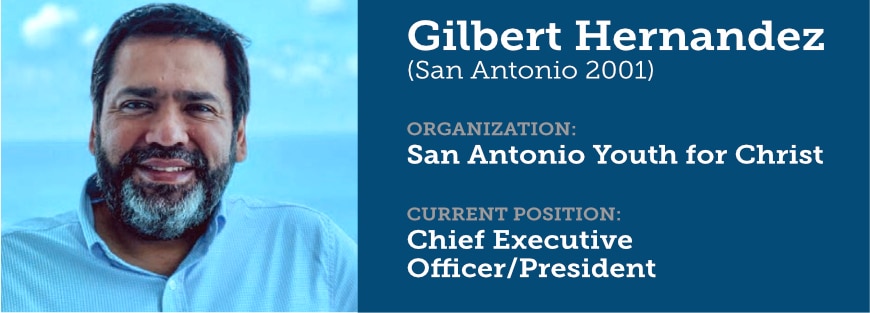Alumni Profile: Gilbert Hernandez (San Antonio 2001)
Posted by: Dionne Peeples-Jones (Portland 2003) | December 15, 2020

You became a youth pastor at the age of 18. How did you know you were called to youth ministry?
I was going to be an attorney. I saw my parents suffer and sacrifice [in ministry], and I didn’t want that. I argued with God. I said, “I will make money and support my parents.” I was in my bedroom when I surrendered to Christ—crying and feeling His calling while arguing that I didn’t want to give up what I thought was going to be a great life as an attorney. In my heart, I remember God said, “I don’t want your money. I want you.” I said, “Okay! My heart, my life, my career, whatever you want me to do, I’m yours.” At that moment, with Jesus, my life was forever changed. My father was a pastor, and he asked me if I would help with the youth. I remember going into the church one day and saying, “Lord, you have to give me a love for these kids because I don’t want to do it.” He did. Here I am, 20 years later, with that same love.
Your father had you work in the fields as a boy. What did that experience do for you?
One summer, my father said, “You’re going to go with your uncle in the fields. You’re a smart kid, and one day you’ll lead people. But you need to know what it is like to come home with your hands hurting.” I worked all day as a migrant. We’d get up at 4:30 in the morningmand sharpen a hoe. We hoed out sugar beet fields. We picked tomatoes and cucumbers and cleared fields. This taught me the value of a hard day’s work. The children we are serving are migrant children too. I remember how people treated us. It changed how I love and serve people.
What is your mission for youth, and how are you fulfilling it?
Our mission is to bring young people who are far away from the Lord into a relationship with Jesus Christ and become lifelong followers of Him. We work in public schools. Prior to COVID-19, we were engaging 1,300 kids a week in the schools with Christian mentors. God has given us a unique place in San Antonio to mobilize the church in engaging lost students with the gospel in public schools. Across San Antonio, we are engaging 8,000 kids a year in 13 public schools. It’s a great partnership!
How have you managed to reach students through the COVID-19 challenges?
We moved programming online and got creative. We did an online campus club and a weekly TV show. I’ve got to give it to my team. They love children well. We did Zoom and Google Hangouts. By mid- summer, youth were tired of Zoom, so we pivoted back to in-person programming. We’re meeting in churches, homes, and offices that are being retrofitted.
You’ve said, “Relationships move at the speed of trust.” How has that philosophy helped to leverage relationships and partnerships?
Some churches want to get into schools, and we leverage that relationship. We’re that sinew—not pretty or fancy. We bring people together, and lives are changed. The body (of believers) can move forward. We work with UTSA (University of Texas at San Antonio) and the public health department. We want to be the best youth nonprofit in the city, not the best Christian youth nonprofit. We pushed in. We are the only faith organization in those partnerships. We also have relationships with the city of San Antonio and Big Brothers Big Sisters of America. When we first started, no one knew who we were. Now, if anything is happening with youth in our city, we are called to be a key voice of faith. We’ve leveraged all those relationships to advance the kingdom of God in places where the church is not usually active or vocal. Even as our mayoral leadership has changed, we’ve leveraged that to stay in leadership.
How has the core value of empowerment played a role in your organization?
We started discipling youth through our one-year program called Leaders in Training. Youth grow in Jesus, and they have a place where they belong. We help them connect to a local church and teach them how to be leaders. Less than two years ago, we had 37 kids who came to know Jesus and are now being discipled and launched into service. Over the last three years, four youth pastors have come from that group. We’re seeing God do amazing work as we create a leadership pipeline. Even in middle school, we are empowering students through a program called Student Staff at Middle School. At first, you see the kids and wonder if they are going to make it. Then you see them sharing the gospel. It’s been a beautiful journey. Too many young people are given a bad rap for being lazy, but if they are given the right mission, they can change the world.
What has the program accomplished that makes you most grateful?
We have developed and prepared leaders for the next generation of youth ministry. Two years ago, they didn’t know Jesus. They were drinking, cutting themselves, and sleeping around. Now, they are leaders and sharing the gospel. I am grateful to the Lord that I have been a part of that process.
As you move forward, how can your DVULI family be praying for you?
Pray that the Lord would send more laborers to the harvest. We’re raising money and discipling kids, but it never feels like we have enough people. God spoke to my heart, saying, “You’re not going to hire your way; you’re going to disciple your way.” That’s my heart’s cry.

